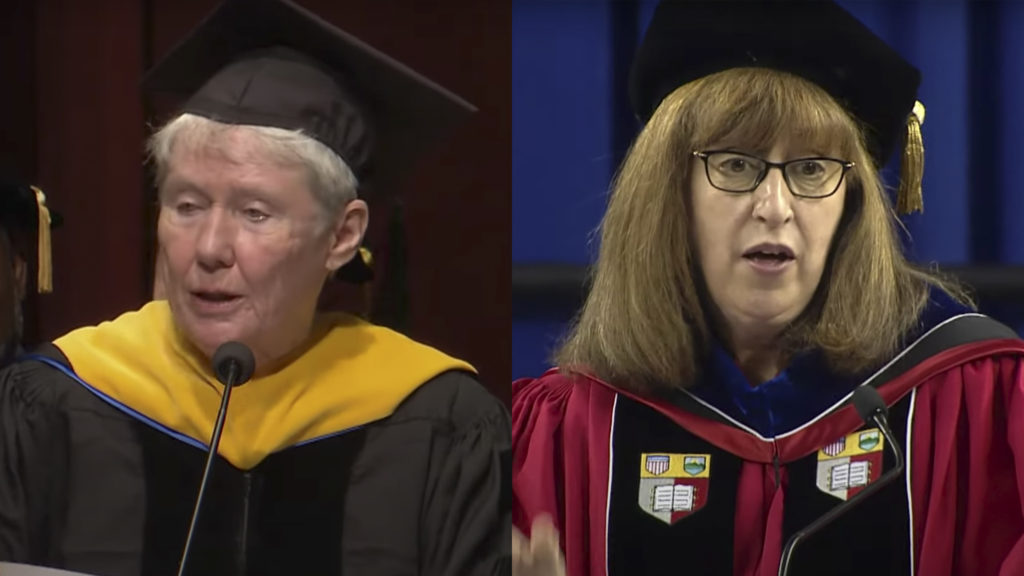Two computer scientists give commencement addresses at Michigan

Two presidents of academic institutions, both prominent computer scientists, gave commencement addresses this Spring at the University of Michigan.
Maria Klawe, President of Harvey Mudd College, addressed graduates of the Rackham Graduate School in Rackham Auditorium on Friday, April 29. Martha Pollack, President of Cornell University, addressed graduates of the College of Engineering in Crisler Arena on Saturday, April 30.
At the Rackham commencement, University of Michigan President Mary Sue Coleman introduced Klawe as a “renowned mathematician, computer scientist, and scholar.” Coleman noted that Klawe has “dedicated her career to creating science and engineering cultures that support everyone with the ability and interest, independent of gender, race, or other factors.”
In her address, Klawe declared that ability is the least important factor in achievement and impact, whether in research or in changing the world. Instead, she suggested that success comes from picking a good problem; persisting and working hard, especially when success is doubtful; and regularly evaluating one’s approach and being willing to re-evaluate one’s strategy.
Klawe offered three points of advice for achieving success and impact in the world, which she illustrated with examples from her own career and life: Pursue your passion where there is a need; Be open to the unexpected and unwanted; and It’s never too late to learn something difficult.
In remarks, Klawe related how she discovered the need for computer scientists, and as a mathematician took advantage of this. An unexpected detour into industry at IBM introduced her to a culture of inclusion and provided management training, setting the stage for her largest accomplishments once she returned to academia. And the actions of a friend who pushed her into skiing lessons later in life illustrated how being challenged continues to make one a better teacher and learner.
Klawe’s full address can be viewed here:
At the College of Engineering commencement, Robert J. Vlasic Dean of Engineering Alec Gallimore introduced Pollack as an expert in artificial intelligence and noted her University of Michigan roots as “university provost and executive president for academic affairs, dean of the School of Information, and as a faculty member in department of Electrical Engineering and Computer Science.”
In her address, Pollack reminded the graduates that while every field is important to society, engineers are special. The study of engineering, she pointed out, has equipped engineering graduates with the ability to do the one thing that all graduating students are urged to do: change the world. She reminded the audience how their engineering training uniquely enables them as problem solvers.
To reinforce her point, Pollack pointed to the increasing number of university presidents and CEOs with backgrounds as engineers and computer scientists. She spoke about how her own training as a computer scientist prepared her to see problems, analyze them, and create solutions.
In terms of problem solving techniques, Pollack referred to the CS concepts of iterative refinement and computational complexity. She spoke of strategies for addressing problems by breaking them into chunks and creating reusable solutions. She also advised listeners to be aware of the kinds of problems for which one can get only an approximate solution, and of not letting the perfect be the enemy of the good.
But to achieve a real impact on big problems, Pollack reminded the graduates to always think about and how the best engineers know that engineering is about the human elements, the human context of solutions.
Pollack’s full address can be viewed here:


 MENU
MENU